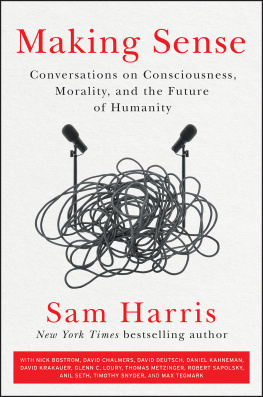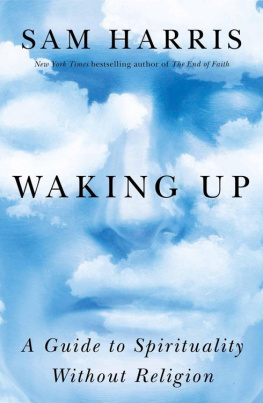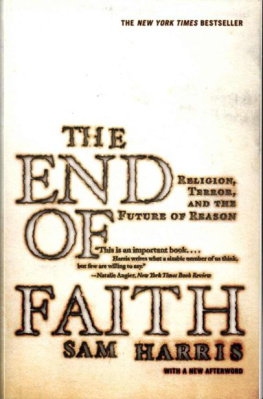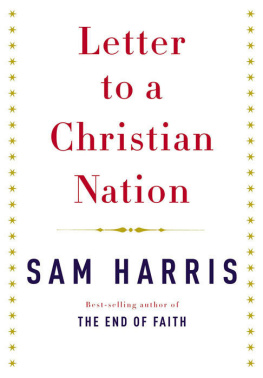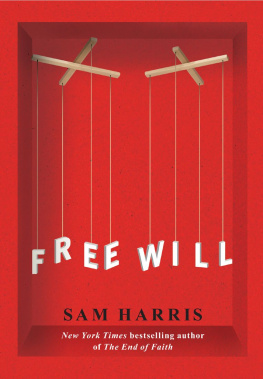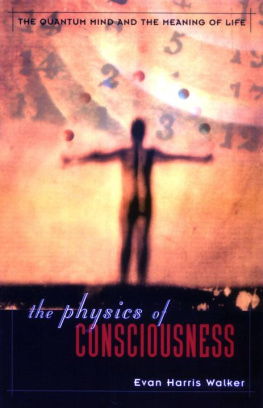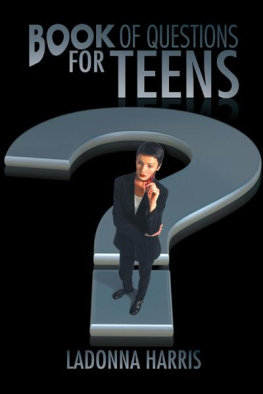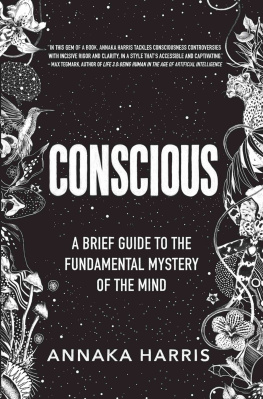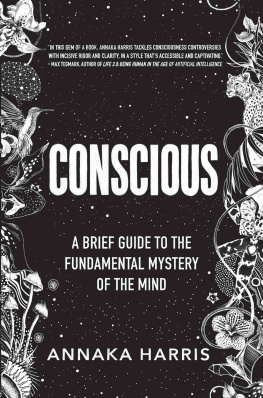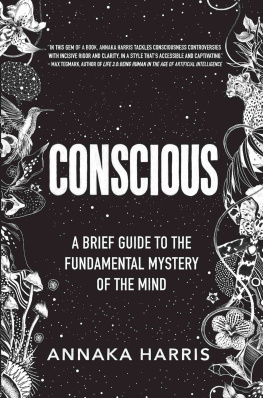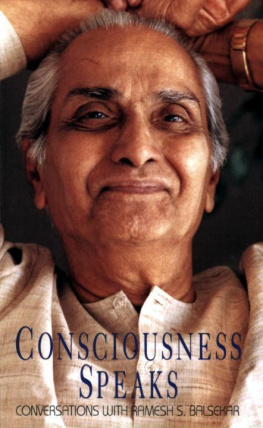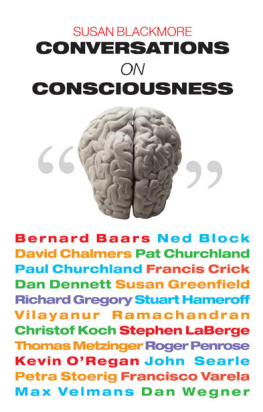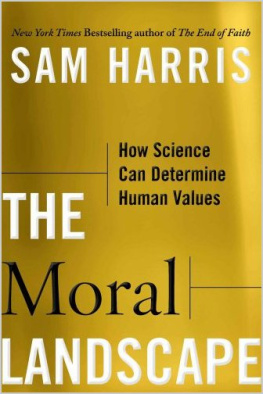Sam Harris - Making Sense: Conversations on Consciousness, Morality, and the Future of Humanity
Here you can read online Sam Harris - Making Sense: Conversations on Consciousness, Morality, and the Future of Humanity full text of the book (entire story) in english for free. Download pdf and epub, get meaning, cover and reviews about this ebook. year: 2020, publisher: HarperCollins, genre: Religion. Description of the work, (preface) as well as reviews are available. Best literature library LitArk.com created for fans of good reading and offers a wide selection of genres:
Romance novel
Science fiction
Adventure
Detective
Science
History
Home and family
Prose
Art
Politics
Computer
Non-fiction
Religion
Business
Children
Humor
Choose a favorite category and find really read worthwhile books. Enjoy immersion in the world of imagination, feel the emotions of the characters or learn something new for yourself, make an fascinating discovery.
- Book:Making Sense: Conversations on Consciousness, Morality, and the Future of Humanity
- Author:
- Publisher:HarperCollins
- Genre:
- Year:2020
- Rating:5 / 5
- Favourites:Add to favourites
- Your mark:
- 100
- 1
- 2
- 3
- 4
- 5
Making Sense: Conversations on Consciousness, Morality, and the Future of Humanity: summary, description and annotation
We offer to read an annotation, description, summary or preface (depends on what the author of the book "Making Sense: Conversations on Consciousness, Morality, and the Future of Humanity" wrote himself). If you haven't found the necessary information about the book — write in the comments, we will try to find it.
Making Sense: Conversations on Consciousness, Morality, and the Future of Humanity — read online for free the complete book (whole text) full work
Below is the text of the book, divided by pages. System saving the place of the last page read, allows you to conveniently read the book "Making Sense: Conversations on Consciousness, Morality, and the Future of Humanity" online for free, without having to search again every time where you left off. Put a bookmark, and you can go to the page where you finished reading at any time.
Font size:
Interval:
Bookmark:
To my mother
We are living in a new golden age of public conversation.
Millions of us have recently discovered that significant parts of the daya commute, an hour at the gym, an eternity spent on the threshold of sleepcan be filled with podcasts and related media. Increasingly, we replace the voice in our heads with the voices of otherswhose opinions, whether considered or not, now inform our own. Im convinced that this is generally a good development. Every hour, we struggle to maintain a vast, technological civilization, and yet conversation remains our only means of making intellectual and moral progress.
Podcasting began in 2004, which happens to be the year I published my first book. If someone had told me then that I would eventually spend most of my time producing a podcast, rather than writing, I would have said, Whats a podcast? If they had then described this new form of mediamore or less accuratelyas radio on demand, I would have been willing to bet the fate of our species that they were mistaken about me. For as long as I can remember, Ive wanted to write books. At no point in my life have I spent two consecutive breaths wondering whether I might like to work in radio.
And yet, creating the Making Sense podcast has consumed most of my professional energy in recent years. The reasons for this are disconcertingly simple: I will reach more people in forty-eight hours with my next podcast than I will reach in a decade with all of my books. And the results are instantaneous: instead of waiting a year for a book to be published, I can release a podcast the moment its finished.
In truth, the analogy to radio is somewhat misleading. The distinction between a radio show that is allotted a full hour in a fixed schedule, and a podcast episode that just happens to wrap up after fifty-nine minutes, can be hard to appreciate from the outside. But the difference is felt every moment along the way. Time pressure changes everythinga fact that anyone can perceive when watching a formal debate. A willingness to explore adjacent topics, to backtrack, to try ideas on for size only to discard them, to invite criticism without knowing what ones response to it will beand when disagreements surface, to give ones opponents the freedom to present the best possible case for their viewssuch a spirit of dialogue can only arise when the threat of being interrupted isnt further weaponized by a ticking clock. When we are guided by real curiosity and a principle of charity, every human problem seems to admit of solution. In other moods, even conversation itself proves impossible.
Podcasting is the only medium that allows for truly natural, open-ended conversation. So its not an accident that this is where scientists, journalists, and public intellectuals now think out loud. But the strength of the medium is also its primary weakness, because conversation lacks the precision of written work. And listeners may fail to catch subtle points that readers would naturally pause to absorb. Thus, when compared to the clarity and accessibility of books, even some of the most interesting podcasts can feel like missed opportunities.
In this volume, Ive collected some of my favorite conversations from Making Sense and adapted them for print. To do this, Ive asked my guests to refine their side of the exchange, and Ive done the same to mine. The result follows the pattern of our original conversation, but weve made many small amendments and clarifications throughout. Now, everyone involved can be counted upon to have said what they truly mean.
Since 2014, Ive released over two hundred episodes of the Making Sense podcast, now averaging about one per week. This volume presents thirteen of my favorites, with eleven guestsDavid Chalmers, David Deutsch, Anil Seth, Thomas Metzinger, Timothy Snyder, Glenn Loury, Robert Sapolsky, Daniel Kahneman, Nick Bostrom, David Krakauer, and Max Tegmark. The book covers a wide range of concernsconsciousness, the foundations of knowledge, ethics, artificial intelligence, politics, physics, decision making, racism, violence, existential riskbut it is heavily weighted toward questions about the nature of mind and how minds like ours can best create a world worth living in. As listeners to Making Sense know, these are my core interests, and I return to them often.
I have long believed in the ultimate unity of knowledge, and thus that the boundaries between traditional disciplines should be generally ignored. One thing we surely know about reality at this point, is that it isnt partitioned like a university campus. I also believe that most of the evil in our worldall the needless misery we manufacture for one anotheris the product, not of what bad people do, but of what good people do once in the grip of bad ideas. Taken together, these principles suggest that there is no telling how much moral progress we might make by removing the impediments to clear thinking on any topic that interests us.
For instance, as I write these lines the world is still struggling to understand the gravity of the COVID-19 pandemic, which has now spread to 187 countries. Political, philosophical, religious, and economic beliefs now contend with the basic principles of epidemiology in the brains of millions of people, some of whom are responsible for making and enforcing policies that will affect the lives of billions. There is still no consensus on how societies should respond to this crisis, and factions have formed on the basis of entirely different views of terrestrial reality. Has the danger of this disease been exaggerated for political gain? Is it unethical to force businesses to close and people to stay indoors in an effort to slow the contagion? Do governments have a responsibility to provide free health care to their citizens? Should the Chinese be admonished to stop eating bats, or would that be a sign of racism? Where is the boundary between contrarian thinking and deadly misinformation? Everywhere one looks, one sees the ruins of failed epistemologyand bad ideas are getting people killed.
There are now nearly one million different podcasts to choose from. Many just give voice to the general pugnacity of our ageand my own podcast has not been entirely immune. But the antidote to bad conversations is always better ones. And here I present some of the most satisfying conversations Ive ever had.
Enjoy...
Sam Harris
May 6, 2020
Los Angeles
Trying to understand consciousness has long been a foundational interest of mine, and given his role in sparking that interest, I begin Making Sense with David Chalmers. A philosopher at New York University and at the Australian National University, Chalmers is also a codirector of the Center for Mind, Brain, and Consciousness at NYU.
We spend most of our time discussing the nature of consciousness and why it is so difficult to understand scientifically. We begin with Chalmerss notion of the hard problem of consciousnessa phrase that has influenced every debate on the subject since the early 1990s. We also talk about artificial intelligence, the possibility that the universe is a simulation, and other fascinating topics, some of which may seem impossibly distant from the concerns of everyday life. But I would urge you not to be misled here. All of these topics will become more and more relevant as we continue to build technology that, whether conscious or not, will seem conscious to us. And as we confront the prospect of augmenting our own minds by integrating devices directly into our brains, all of these philosophical puzzles will become matters of immediate personal and ethical concern.
Harris: Youve played an important role in my intellectual life. I went to one of those early biennial Tucson conferences on consciousness, at the University of Arizona. I had dropped out of school, and I guess you could say I was looking for some direction in life. Id become interested in the conversations that were happening in the philosophy of mindinitially because of the sparring between Daniel Dennett and John Searle. Then I saw an ad for the Tucson conference, probably in the
Font size:
Interval:
Bookmark:
Similar books «Making Sense: Conversations on Consciousness, Morality, and the Future of Humanity»
Look at similar books to Making Sense: Conversations on Consciousness, Morality, and the Future of Humanity. We have selected literature similar in name and meaning in the hope of providing readers with more options to find new, interesting, not yet read works.
Discussion, reviews of the book Making Sense: Conversations on Consciousness, Morality, and the Future of Humanity and just readers' own opinions. Leave your comments, write what you think about the work, its meaning or the main characters. Specify what exactly you liked and what you didn't like, and why you think so.

